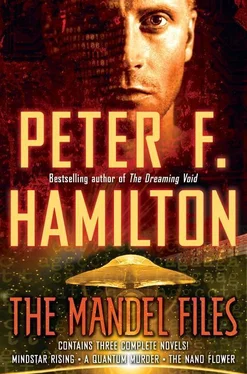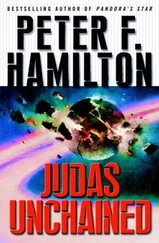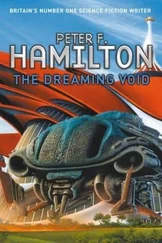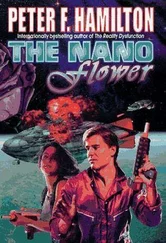“Eduard Muller,” Peter Cavendish told her. “He’s one of Mutizen’s vice-presidents, in charge of their Prior’s Fen Atoll power engineering division. Top notch.”
“Power engineering,” Julia mused. “It has a certain ring to it, I suppose.”
Eduard Muller was a professional premier-grade executive, London suit, Italian shoes, French shirt, sado smile. He had a ginger crew cut, and carefully shaded tan, cloned clear green eyes; his age was indeterminately forty.
Julia hated the sight of him, his manners would be as smooth as his clothes, his English unaccented, they might as well have sent her a cyborg.
He sat in a high-back chair beside Peter Cavendish, radiating friendliness. Two young assistants stood behind him, one male, one female, blank courteous faces. The woman kept a slim black leather briefcase folded under her arm.
“I’ll come straight to the point,” Julia said as she left her big breakfast cup of tea to cool on the desk. “As you can tell from the priority I’ve assigned this meeting, I’m extremely interested in acquiring atomic structuring technology. Nicholas here is full of praise for its potential.”
Eduard Muller’s eyes flicked to an embarrassed Nicholas Beswick, then back to Julia. “We had every confidence you would be. Obviously we are strongly in favour of an association with Event Horizon, your size and technical ability would make you a perfect partner to help us exploit this technology. A partnership would be most rewarding for both of us.”
“You are envisaging a fifty-fifty split?” Julia asked.
“Yes, although we would expect you to perform most of the final development stage given that we have provided a theoretical framework for you to work from. Your solid-state research division is second to none, whereas it is no secret we lack in that direction. After that, production and marketing would be a joint effort, perhaps handled by a newly created subsidiary, with Event Horizon and Mutizen each holding fifty per cent of the stock.”
“So far all you have shown us is a sequence of interesting equations. I shall require far more substantial data before I can even begin to make a decision.”
“What sort of data were you thinking of?” Eduard Muller asked.
“Your complete research findings on the practicality of a nuclear force generator.”
“It is within my brief to offer you such additional data in return for a certain level of commitment visible on your side.”
“Good,” said Julia. “Because unless we see some proof that the force generator is theoretically possible, there can be no deal.”
“The data we have assembled concerning the force generator does indicate that it is possible to construct one. It can be made available, providing Event Horizon deposits two hundred million New Sterling in a neutral account as a guarantee of confidentiality. Please understand, I do not ask this lightly. But I’m sure that by now you appreciate the implications of this techuology. It is quite capable of instigating a profound revolution in the pattern of our lives. Its defence applications alone would bring in a revenue far in excess of Event Horizon’s annual turnover.”
“Oh, yeah,” Julia drawled. “I’m aware of the implications. So aware I’m surprised you’re prepared to share atomic structuring with anyone.”
Eduard Muller was good, she had to admit that. His face could have been machine-milled steel for all the expression he showed.
“As I said, we have the theorists, you have the facilities; strengths and weaknesses corresponding, the basis of all mutually profitable ventures.”
“Hmmm.” Julia sipped her tea. She’d been expecting Eduard Muller to spring something like the deposit. A standard business tactic. Mutizen would want to know exactly how keen she was to acquire the atomic structuring technology.
“I will give you an answer in two days,” Julia said.
Eduard Muller inclined his head, the first hint of emotion he had betrayed. “Of course.”
“Providing you do not make a similar offer to anyone else during that time. You will thumbprint an agreement to that effect before you leave.”
“Ah.” He offered a reluctant smile.
“It will give my assessment team time to draw up a full report based on the data they already have. That’s reasonable, surely? Two days isn’t going to make any difference to a project of this undertaking. Besides, it will take that long for you and Peter to thrash out the confidentiality clauses; even I don’t put two hundred million on the line without reading the small print first.”
“Very well, Ms Evans. I think Mutizen can agree to that.”
“Odd,” Peter Cavendish said after Eduard Muller and his two assistants had left.
“Yes,” Julia agreed. “They produce a few giga-bytes of data, and we embark on an open-ended research project for them.” There was something else, the way Eduard Muller had been wanting a decision straight away. Even if he had wanted it, he shouldn’t have shown her that he did. Either he wanted her to know, which made even less sense, or he was under a great deal of stress. Whatever the answer, she had more cards to play with than she’d started with.
She got up and walked over to the window. The mist had melted away under the first rays of the sun, exposing the chocolate mud of the quagmire. Tepid oil-rainbows shivered across its surface. “He was right about one thing, though. I can’t afford not to be involved.”
Peter Cavendish rose from his seat. “You think they have solved the generator problem?”
“No. At least, nothing past a fundamental theory, a notion how it might be built; that’s why they want to bring in Nicholas and his team.”
“So what do you want me to do?”
“I’ll need you to draw up two sets of contracts. The worst case, where we have to agree to Mutizen’s current terms. The second, I want Mutizen paying half of the development costs with us, and Event Horizon owning fifty-one per cent of the marketing subsidiary stock.”
Peter Cavendish let out a whistle. “Do you think you can get them to agree to that?”
Julia abandoned the view of Prior’s Fen Atoll. If she closed her eyes she could see hologram-colour data streams like arched fairy bridges looping around her. She was woven into the web via her implant nodes, digesting and contributing, but never controlling. The topography of the global data net had long left human understanding behind.
The key to the modern world is retrieval, Royan had told her. All the answers you could possibly want exist somewhere within the world’s data cores.
She didn’t know what questions to ask. The glowing data web was contracting. Smothering.
Julia opened her eyes, seeing Peter Cavendish’s concerned face.
“We’ve got two days to find some leverage,” she said. “In the mean time, I’ve got a speech day to attend.”
Greg slipped his leather jacket over a sky-blue sweatshirt. The black leather was thin enough to move easily, thick enough to shield him from the chill of early morning. It had been a present from Eleanor a couple of years back when his old one had finally torn.
“You’re going to wear that in Monaco, are you?” Eleanor asked. She was sitting on the edge of their bed, wrapped in a quilted housecoat. Hands fidgeting in her lap, knotting and unknotting the belt.
Greg glanced at himself in the bedroom’s antique full-length mirror. Flat stomach, sideburns frosted with grey, a hint of excess flesh building up on his neck. Not bad for fifty-four. He managed to get down to the gym in Oakham twice a week, the fitness bug was something he’d caught during his Army days. After surviving the war in Turkey and the street violence in Peterborough, it would be silly to succumb to clogged arteries and wasted muscles.
Читать дальше












